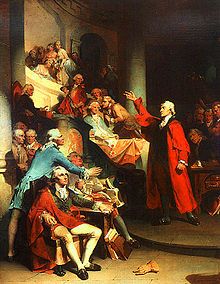This is your morning Open Thread. Pour your favorite beverage and review the past and comment on the future.
Find the past “On This Day in History” here.
March 24 is the 83rd day of the year (84th in leap years) in the Gregorian calendar. There are 282 days remaining until the end of the year.
March 24th is the 365th and last day of the year in many European implementations of the Julian calendar.
On this day in 1989, Exxon Valdez runs aground in Prince William Sound, Alaska.
The worst oil spill in U.S. territory begins when the supertanker Exxon Valdez, owned and operated by the Exxon Corporation, runs aground on a reef in Prince William Sound in southern Alaska. An estimated 11 million gallons of oil eventually spilled into the water. Attempts to contain the massive spill were unsuccessful, and wind and currents spread the oil more than 100 miles from its source, eventually polluting more than 700 miles of coastline. Hundreds of thousands of birds and animals were adversely affected by the environmental disaster.
It was later revealed that Joseph Hazelwood, the captain of the Valdez, was drinking at the time of the accident and allowed an uncertified officer to steer the massive vessel. In March 1990, Hazelwood was convicted of misdemeanor negligence, fined $50,000, and ordered to perform 1,000 hours of community service. In July 1992, an Alaska court overturned Hazelwood’s conviction, citing a federal statute that grants freedom from prosecution to those who report an oil spill.
The Exxon Valdez oil spill occurred in Prince William Sound, Alaska, on March 24, 1989, when the Exxon Valdez, an oil tanker bound for Long Beach, California, struck Prince William Sound‘s Bligh Reef and spilled 260,000 to 750,000 barrels (41,000 to 119,000 m3) of crude oil. It is considered to be one of the most devastating human-caused environmental disasters. As significant as the Valdez spill was-the largest ever in U.S. waters until the 2010 Deepwater Horizon oil spill-it ranks well down on the list of the world’s largest oil spills in terms of volume released. However, Prince William Sound’s remote location, accessible only by helicopter, plane and boat, made government and industry response efforts difficult and severely taxed existing plans for response. The region is a habitat for salmon, sea otters, seals and seabirds. The oil, originally extracted at the Prudhoe Bay oil field, eventually covered 1,300 miles (2,100 km) of coastline, and 11,000 square miles (28,000 km2) of ocean. Then Exxon CEO, Lawrence G. Rawl, shaped the company’s response.
Exxon Valdez left the Valdez oil terminal in Alaska at 9:12 pm on March 23, 1989, bound for Long Beach, California. The ship was under the control of Shipmaster Joseph Jeffrey Hazelwood. The outbound shipping lane was obstructed with small icebergs (possibly from the nearby Columbia Glacier), so Hazelwood got permission from the Coast Guard to go out through the inbound lane. Following the maneuver and sometime after 11 p.m., Hazelwood left Third Mate Gregory Cousins in charge of the wheel house and Able Seaman Robert Kagan at the helm. Neither man had been given his mandatory six hours off duty before beginning his 12-hour watch. The ship was on autopilot, using the navigation system installed by the company that constructed the ship. The ship struck Bligh Reef at around 12:04 a.m. March 24, 1989.
Beginning three days after the vessel grounded, a storm pushed large quantities of fresh oil on to the rocky shores of many of the beaches in the Knight Island chain. In this photograph, pooled oil is shown stranded in the rocks.According to official reports, the ship was carrying approximately 55 million US gallons (210,000 m3) of oil, of which about 11 to 32 million US gallons (42,000 to 120,000 m3) were spilled into the Prince William Sound. A figure of 11 million US gallons (42,000 m3) was a commonly accepted estimate of the spill’s volume and has been used by the State of Alaska’s Exxon Valdez Oil Spill Trustee Council, the National Oceanic and Atmospheric Administration and environmental groups such as Greenpeace and the Sierra Club. Some groups, such as Defenders of Wildlife, dispute the official estimates, maintaining that the volume of the spill has been underreported. Alternative calculations, based on an assumption that the sea water rather than oil was drained from the damaged tanks, estimate the total to have been 25 to 32 million US gallons (95,000 to 120,000 m3).
Multiple factors have been identified as contributing to the incident:
* Exxon Shipping Company failed to supervise the master and provide a rested and sufficient crew for Exxon Valdez. The NTSB found this was wide spread throughout industry, prompting a safety recommendation to Exxon and to the industry.
* The third mate failed to properly maneuver the vessel, possibly due to fatigue or excessive workload.
* Exxon Shipping Company failed to properly maintain the Raytheon Collision Avoidance System (RAYCAS) radar, which, if functional, would have indicated to the third mate an impending collision with the Bligh reef by detecting the “radar reflector”, placed on the next rock inland from Bligh Reef for the purpose of keeping boats on course via radar.In light of the above and other findings, investigative reporter Greg Palast stated in 2008 “Forget the drunken skipper fable. As to Captain Joe Hazelwood, he was below decks, sleeping off his bender. At the helm, the third mate never would have collided with Bligh Reef had he looked at his RAYCAS radar. But the radar was not turned on. In fact, the tanker’s radar was left broken and disabled for more than a year before the disaster, and Exxon management knew it. It was (in Exxon’s view) just too expensive to fix and operate.” Exxon blamed Captain Hazelwood for the grounding of the tanker.
In 1991, following the collapse of the local marine population (particularly clams, herring, and seals) the Chugach Alaska Corporation, an Alaska Native Corporation, filed for Chapter 11 bankruptcy protection. It has since recovered.
According to several studies funded by the state of Alaska, the spill had both short-term and long-term economic effects. These included the loss of recreational sports, fisheries, reduced tourism, and an estimate of what economists call “existence value”, which is the value to the public of a pristine Prince William Sound.
The economy of the city of Cordova, Alaska was adversely affected after the spill damaged stocks of salmon and herring in the area. Several residents, including one former mayor, committed suicide after the spill.

 Dr. Kim’s name was not among those widely bandied about since Mr. (Robert B.) Zoellick announced his plans to move on last month. Highly respected among aid experts, Dr. Kim is an anthropologist and a physician who co-founded Partners in Health, a nonprofit that provides health care for the poor, and a former director of the department of H.I.V./AIDS at the World Health Organization. [..]
Dr. Kim’s name was not among those widely bandied about since Mr. (Robert B.) Zoellick announced his plans to move on last month. Highly respected among aid experts, Dr. Kim is an anthropologist and a physician who co-founded Partners in Health, a nonprofit that provides health care for the poor, and a former director of the department of H.I.V./AIDS at the World Health Organization. [..] On this day in 1775,
On this day in 1775,
Recent Comments